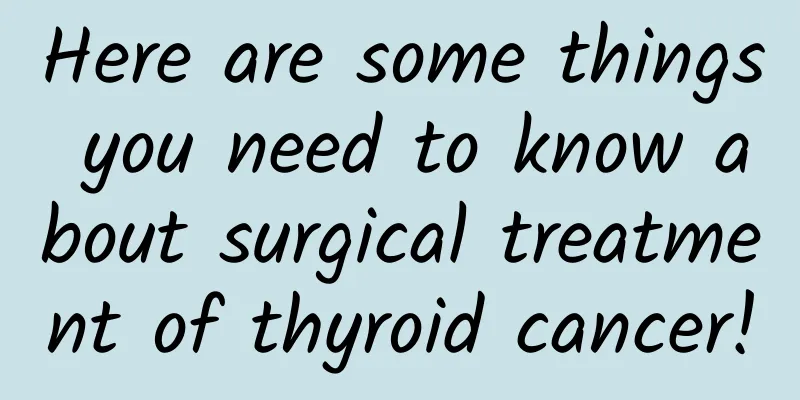Here are some things you need to know about surgical treatment of thyroid cancer!

|
Author: Zhang Bin, Chief Physician, Peking University Cancer Hospital Chairman of the Head and Neck Tumor Committee of the Tumor Branch of the Chinese Medical Doctor Association Reviewer: Li Guangwei, Chief Physician, Fuwai Hospital, Chinese Academy of Medical Sciences Vice Chairman of the Chinese Medical Association Endocrinology Society The thyroid gland, located in the front of the neck, attached to the trachea, is shaped like a butterfly and is known as the "most beautiful gland" in the human body. However, this most beautiful gland is prone to cancer, and many patients have to have it removed. 1. When treating thyroid cancer surgically, does it mean removing the entire thyroid gland? Currently, the surgical methods for thyroid cancer mainly include total thyroidectomy and unilateral lobectomy. The choice is actually determined by the patient's tumor stage. For example, if the thyroid cancer is small in diameter and only grows on one side, and no cervical lymph node metastasis is found before surgery, generally only one side is removed, that is, a unilateral thyroid lobectomy. If the thyroid cancer is large in diameter, or both lobes are cancerous, and lymph node metastasis is found before surgery, total thyroidectomy will generally be performed, that is, complete removal of both lobes of the thyroid gland, and the neck lymph nodes must also be cleared. 2. What are the possible complications of surgical treatment of thyroid cancer? From an anatomical perspective, the recurrent laryngeal nerve is located on both sides of the thyroid gland. It is the main motor nerve for the laryngeal muscles and has a diameter of only about 1 mm. In addition, there are four mung bean-sized parathyroid glands next to the thyroid gland. Its main function is to secrete parathyroid hormone and regulate calcium and phosphorus metabolism in the body. Therefore, the main risk of surgical treatment of thyroid cancer is temporary or permanent damage to the recurrent laryngeal nerve and parathyroid glands. If the recurrent laryngeal nerve is damaged, hoarseness may occur, and if the parathyroid glands are damaged, calcium deficiency symptoms may occur. Figure 1 Original copyright image, no permission to reprint In terms of the incidence of complications, the rates of recurrent laryngeal nerve and parathyroid gland damage are similar, with the probability of temporary injury being around 20% and the probability of permanent injury being around 2%. Of course, if the thyroid cancer is in a very advanced stage, it is difficult to preserve the parathyroid glands and recurrent laryngeal nerves because the cancer has already invaded these two parts. But if it is an early stage patient, the probability of damage is not high. 3. Do I need to take medicine for the rest of my life after thyroid cancer surgery? The thyroid gland is an endocrine organ. Its main function is to synthesize and secrete thyroid hormones. Thyroid hormones play a very important role in regulating human metabolism, growth, development, reproduction and other physiological functions. They are important hormones necessary for human metabolism and growth and development. After thyroid cancer surgery, whether one lobe is removed or all of it is removed, the patient may experience symptoms of hypothyroidism, such as listlessness, loss of appetite, dry skin, etc. Therefore, oral thyroid supplementation tablets are needed for replacement therapy and thyrotropin suppression therapy to prevent recurrence, but the time may be different. If a patient undergoes a total resection, he or she will have to take thyroid hormone for the rest of his or her life and cannot stop taking the medication. If the patient has undergone a one-sided resection, most patients will have to take the medicine for eight to ten years. If the thyroid cancer does not recur, you can consider slowly reducing the dosage of thyroxine tablets. If the patient does not have obvious symptoms of hypothyroidism, you can even stop taking the medicine. 4. Is the cure rate high after thyroid cancer surgery? For differentiated thyroid cancer, such as the most common papillary thyroid cancer, the probability of cure is very high. Our domestic data show that the probability of no tumor recurrence in 5 years is about 86%, and in large cities it can reach more than 90%. Especially for this early differentiated thyroid cancer, it can even be close to 100%. But for other types of thyroid cancer, the data is not so good. For example, for medullary carcinoma, the 5-year survival rate is about 70%, while for undifferentiated carcinoma, the 5-year survival rate may not even reach 10%. Therefore, postoperative follow-up is also particularly important. Figure 2 Original copyright image, no permission to reprint However, there is a 15%-40% recurrence rate for thyroid cancer after surgery, mainly lymph node recurrence and metastasis. Most cases can still be cured after tumor recurrence. Patients can use regular ultrasound examinations to detect abnormal swelling of lymph nodes, and then use puncture examinations to determine whether there is recurrence. For patients who have undergone total thyroidectomy and iodine-131 treatment, there is a very good indicator, which is thyroglobulin. If it is very low, it means there is no recurrence, and if the value is high, it indicates that there may be a recurrence. Therefore, after surgery, you must follow your doctor's orders for regular checkups to detect signs of recurrence in a timely manner and take proactive measures. |
<<: One of the “Four Major Chronic Diseases”! Beware of this Silent Killer
>>: Will long-term consumption of iodized salt lead to thyroid cancer? The answer is…
Recommend
Brown discharge during early pregnancy
In the eyes of women, if their lower body secrete...
Dry mouth and frequent urination in women
When people feel dry mouth, it proves that the am...
What is the disease of sweating on the female back?
In daily life, we often hear people say words lik...
How can women nourish the kidneys?
The symptoms of kidney stones in female friends w...
How to tell if the noodles are cooked? Should you put the eggs or the noodles first?
Nowadays, people are busy with work and life, so ...
Which department should I go to for breast examination?
Breast is one of the secondary sexual characteris...
How to repot the green radish? What to do if the green radish turns yellow after repotting?
The green radish is very suitable for indoor gree...
How long will it take for labor to occur after contractions begin?
Many people know that when the uterus begins to c...
What are the symptoms before menstruation?
It is well known that women have menstruation eve...
Do you need to marinate sweet and sour fish in advance? How to marinate sweet and sour fish better?
Sweet and sour fish is sweet and delicious, with ...
My daughter's lower body is a little itchy, what should I do?
Many parents are very concerned about the itchy l...
How to comfort a girl with a fever
Whenever the temperature changes drastically, man...
I gave birth to a child with hypothyroidism
Important reminder: There are cases of hypothyroi...
Can a cold also land you in the ICU? Be careful of hidden viral myocarditis
Xiao Li is 26 years old, loves sports and is in g...
The chance of pregnancy during polycystic ovulation
If you are diagnosed with polycystic disease when...









